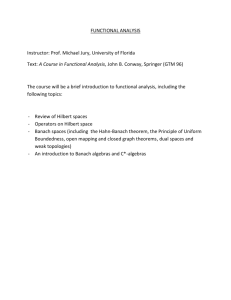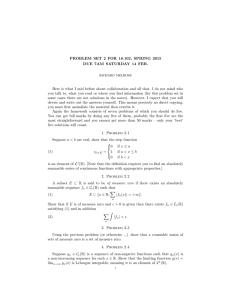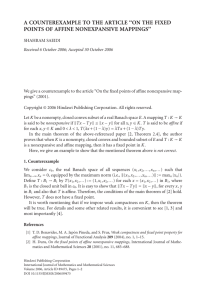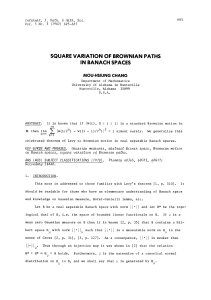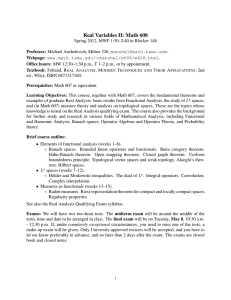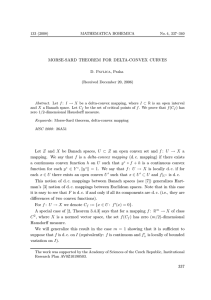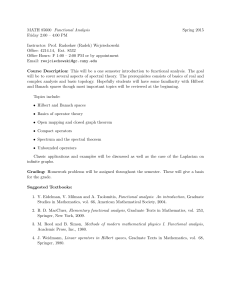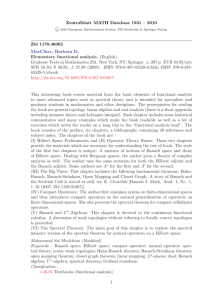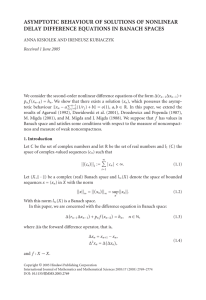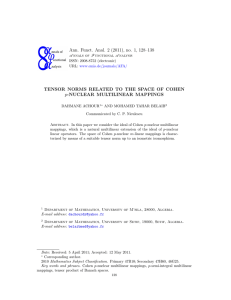RESEARCH NOTES
advertisement
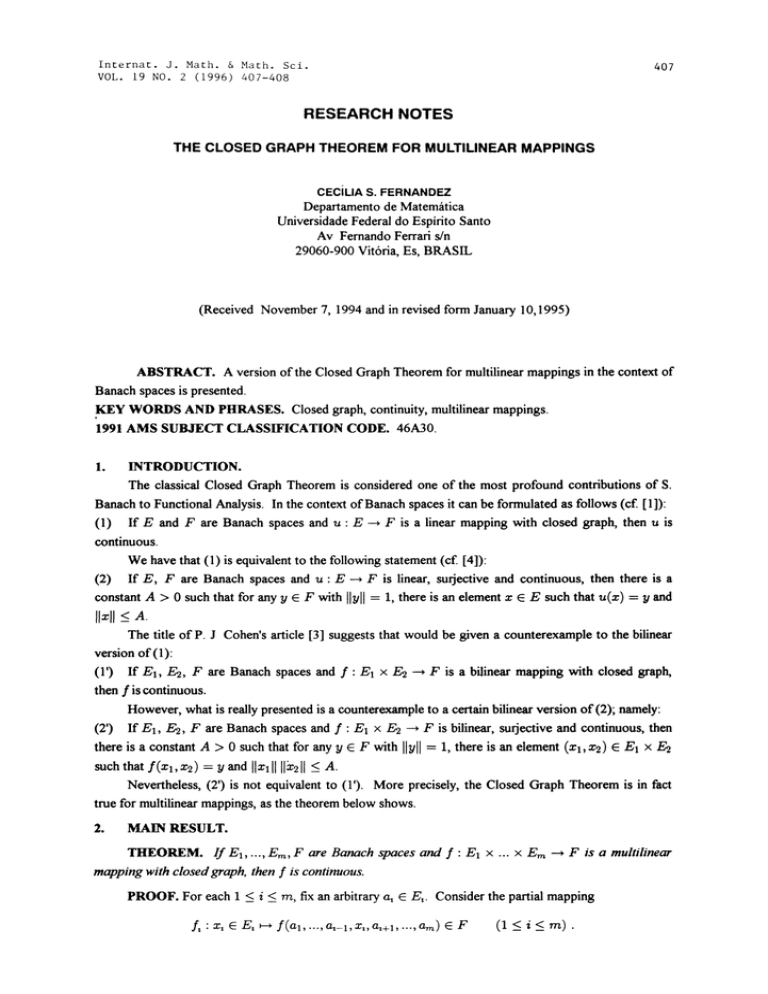
Internat. J. Math. & Math. Sci.
VOL. 19 NO. 2 (1996) 407-408
407
RESEARCH NOTES
THE CLOSED GRAPH THEOREM FOR MULTILINEAR MAPPINGS
CECILIA S. FERNANDEZ
Departamento de Matem/tica
Universidade Federal do Espirito Santo
Av Fernando Ferrari s/n
29060-900 Vit6ria, Es, BRASIL
(Received November 7, 1994 and in revised form January 10,1995)
ABSTRACT. A version of the Closed Graph Theorem for multilinear mappings in the context of
Banach spaces is presented.
KEY WORDS AND PHRASES. Closed graph, continuity, multilinear mappings.
1991 AMS SUBJECT CLASSIFICATION CODE. 46A30.
INTRODUCTION.
The classical Closed Graph Theorem is considered one of the most profound contributions of S.
Banach to Functional Analysis. In the context ofBanach spaces it can be formulated as follows (cf. ]):
(1) If E and F are Banach spaces and u" E --, F is a linear mapping with closed graph, then u is
1.
continuous.
We have that (1) is equivalent to the following statement (cf. [4]):
(2) If//7, F are Banach spaces and u" E F is linear, surjective and continuous, then there is a
constant A > 0 such that for any y E F with Ilyll
1, there is an element x E E such that u(x) y and
Ilxll _< m.
The title ofP. J Cohen’s article [3] suggests that would be given a counterexample to the bilinear
version of (1):
(1’) If El, E2, F are Banach spaces and f" E1 E2 F is a bilinear mapping with closed graph,
then f is continuous.
However, what is really presented is a counterexample to a certain bilinear version of (2); namely:
(2’) If El, E2, F are Banach spaces and f E1 E2 F is bilinear, surjective and continuous, then
there is a constant A > 0 such that for any y E F with I111 1, there is an element (Xl, X2) ( E X F_.,2
such that f(x],x2) /and IIlll IIll _< A,
Nevertheless, (2’) is not equivalent to (1’). More precisely, the Closed Graph Theorem is in fact
true for multilinear mappings, as the theorem below shows.
2.
MAIN RESULT.
THEOREM. If El,..., Em, F are Banach spaces and f
mapping with closed graph, then f is continuous.
El
x
E,,
-
F
is a multilinear
PROOF. For each I _< _< m, fix an arbitrary a, E E,. Consider the partial mapping
f=
:c,
E,
,-
Y(al,...,a,-1,:c,,a,+l,...,am) e t;"
(1 _< <_ m).
408
C.S. FERNANDEZ
By the multilinearity of f, we see that each f, is a linear mapping. Moreover, the graph
closed because it is the image of the closed set
Gr(f) rl ({oq} x
x
{o.,,_1} x .E x {o,,+1} x
x
Gr(f,) of.f, is
{am} x F)
by the homeomorphism
": (o.,1,...,a,_l,xz, a,+l,...,am,) {al} x
(x,, y)
x
{at_l} x .t x {o,,,+1} x
x
{am}
xF
E, x F.
Hence, by the classical Closed Graph Theorem, each f, is continuous. This shows that f is separately
continuous, and therefore f is continuous ([2], Chap. III, 5, proposition 2 and exercise 14).
,REFERENCES
[z]
BANACH, S., Thdorie des Operations Lindaires, Warszawa, 1932.
.[2] BOURBAKI, N., Topological Vector Spaces, Springer-Verlag, 1987.
[3]
COHEN, P.J., A counterexample to the closed graph theorem for bilinear maps, 3’. Func. Anal. 16
(1974), 235-240.
[4]
FERNANDEZ, C.S., O Teorema do Grhfico Fechado e o Teorema de Goldstine para Aplicaces
m-Lineares, Dissertaito de Mestrado, Instituto de Matemhtiea, Universidade Federal do Rio de
Janeiro, 1993.
